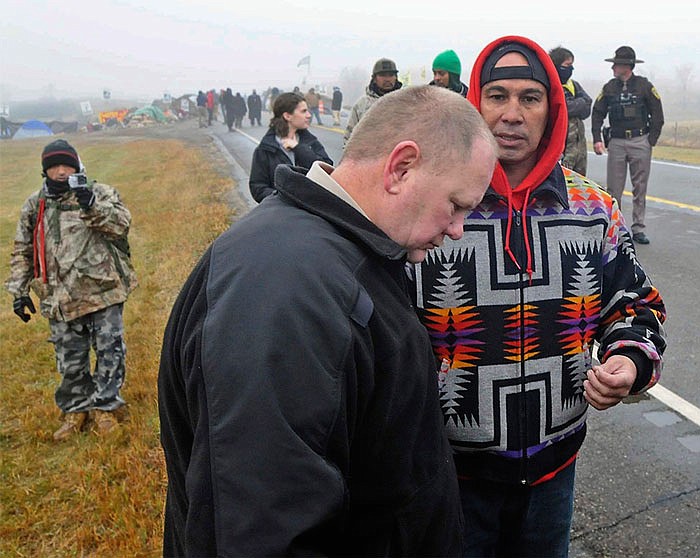MANDAN, N.D. (AP) - Don't look for apologies from the North Dakota sheriff leading the response to the Dakota Access oil pipeline protests, especially for the recent - and, in some circles, controversial - action against demonstrators who he believes have become increasingly aggressive.
"We are just not going to allow people to become unlawful," said Morton County Sheriff Kyle Kirchmeier, a veteran of the North Dakota Highway Patrol and National Guard who was elected to his first term as sheriff about two years ago. "It's just not going to happen."
More than 525 people from across the country have been arrested during months of protests over the four-state, $3.8 billion pipeline, all here in support of the Standing Rock Sioux tribe that's fighting the project because it believes it threatens drinking water and cultural sites on their nearby reservation.
His department's job of policing the protesters - the vast majority who've been camping on federal land that the U.S. Army Corps of Engineers says it'll close in December for safety concerns - has cost the county more than $8 million, even with help from the state Highway Patrol and officers from various states. Their tactics, however, have drawn criticism from Standing Rock's tribal leader as well as protest organizers and celebrities.
Standing Rock Sioux Chairman Dave Archambault said he and Kirchmeier have met many times and each meeting has been tense and unproductive. "I don't think aggressive force is necessary and he thinks it's necessary," Archambault said.
Meanwhile, the Corps of Engineers said it has "no plans for forcible removal" of protesters who have been camping in North Dakota to protest the Dakota Access oil pipeline.
The Corps said in a statement Sunday that it "is seeking a peaceful and orderly transition to a safer location."
The Corps notified tribal leaders Friday that all federal lands north of the Cannonball River will be closed to public access Dec. 5 for "safety concerns." The agency says those who choose to stay do so at their own risk. The Corps says anyone on the property north of the Cannonball River after that date will be trespassing and subject to prosecution.
The land to be closed includes the main protest camp, about 50 miles south of Bismarck.
In the most recent clash between police and protesters, which was near the path of the pipeline and spanned Sunday night into Monday morning, officers used tear gas, rubber bullets and large water hoses in freezing weather. Organizers said at least 17 protesters were taken to the hospital, some for hypothermia and one for a serious arm injury, and one officer was injured.
Archambault called the confrontation an act of terror against unarmed protesters that was sanctioned by Kirchmeier.
"His job is to protect and serve, not to inflict harm and hurt," Archambault said.
But Kirchmeier, who has the backing of the state's Republican governor and attorney general, defended officers' actions. He and other authorities said officers were assaulted with rocks, bottles and burning logs.
Kirchmeier, a 53-year-old married father, grew up in this county, which has a population of fewer than 30,000 people - about 15 residents per square mile. He retired from the North Dakota Highway Patrol as a captain after 29 years, and had served in the National Guard for four years.
The protests are demanding: Kirchmeier hasn't had a day off since August, routinely working more than 12 hours a day. The 34 deputies in his department are pulling similar shifts, he said, even with help from more than 1,200 officers from North Dakota and nine other states.
Some officers have been targeted online by protesters, Kirchmeier included. He said someone recently posted the location of his father's grave, which he took as an effort to intimidate.

